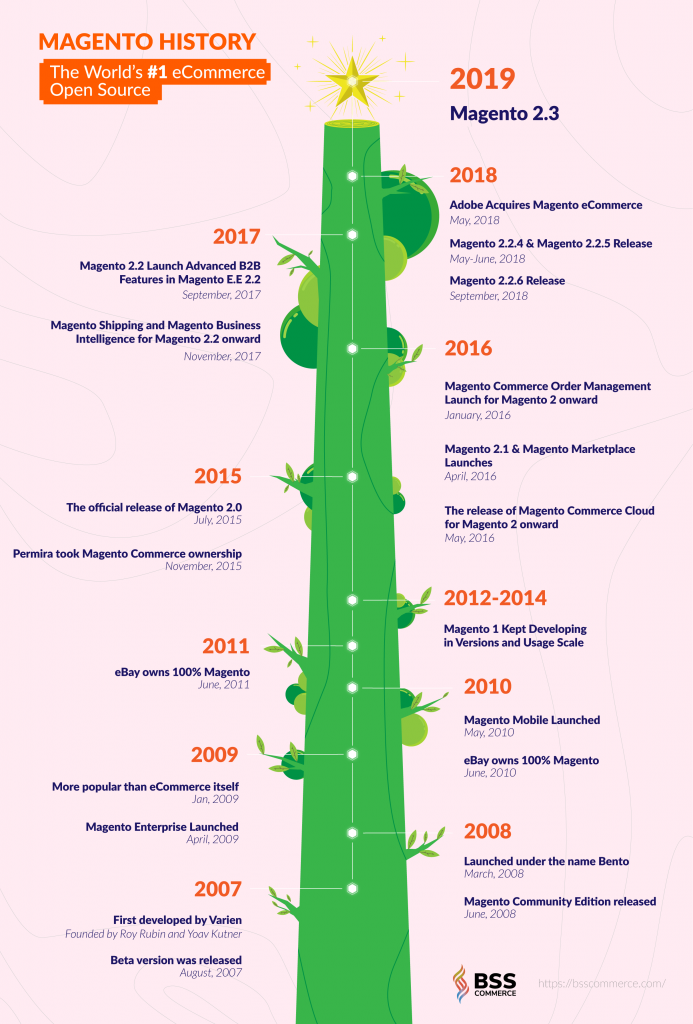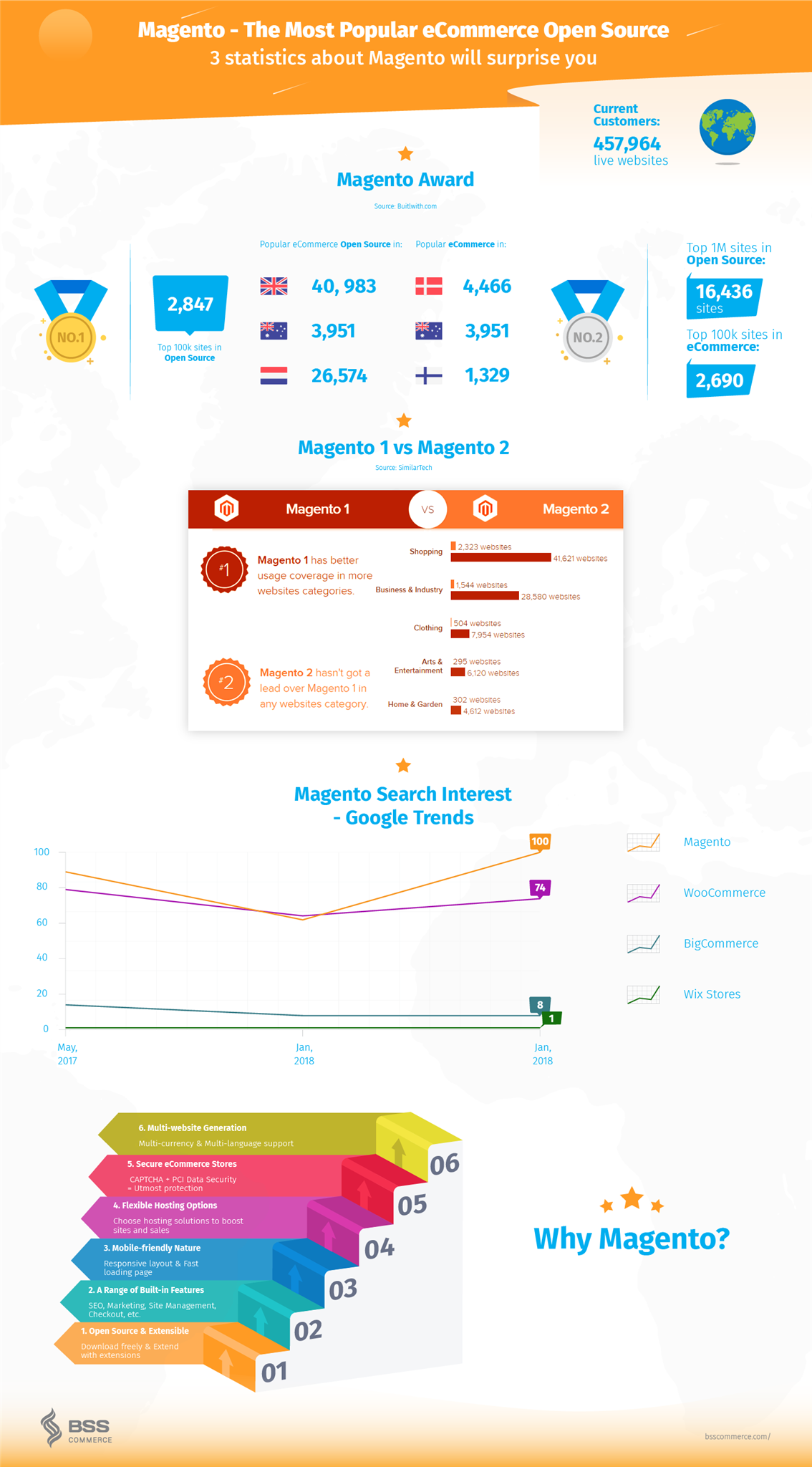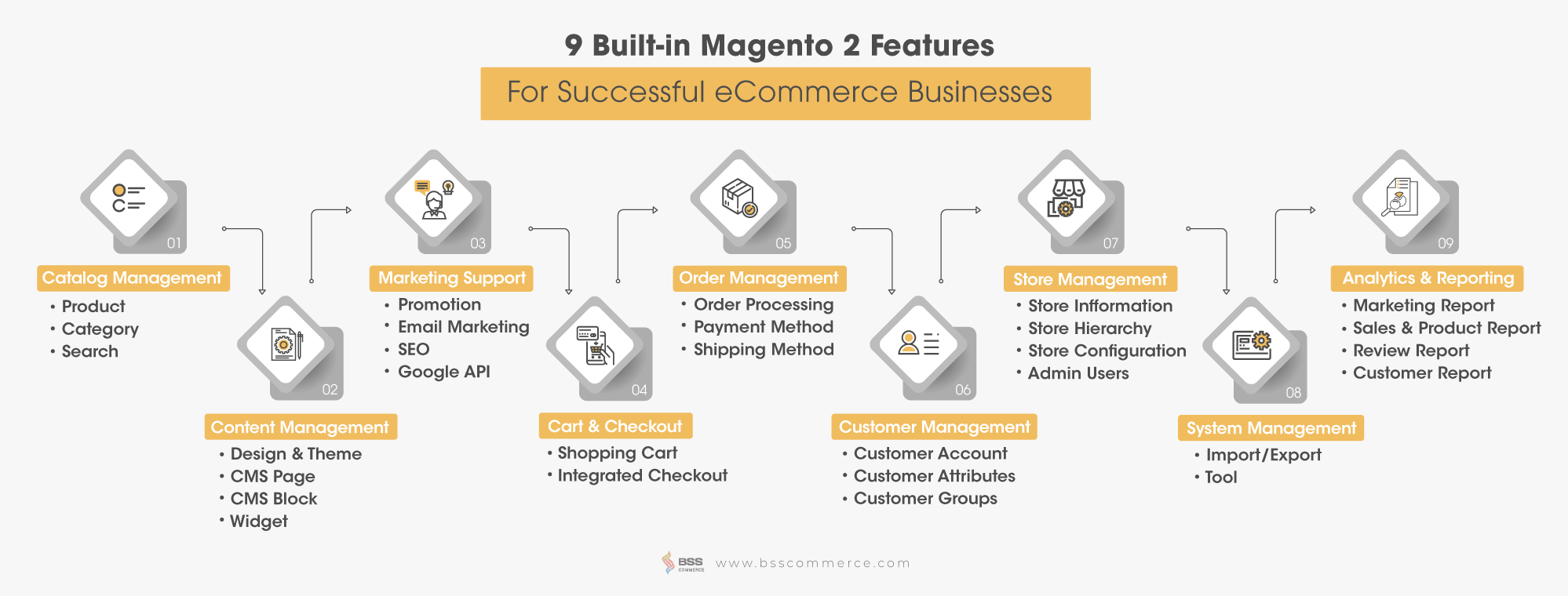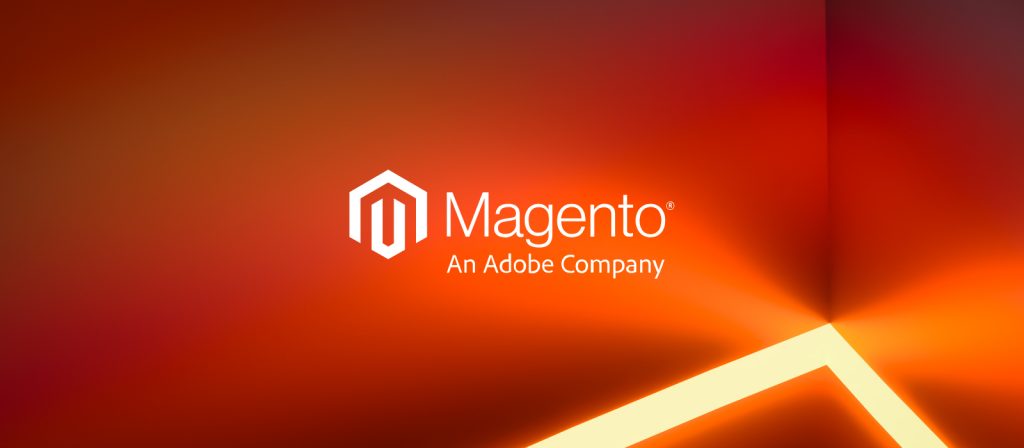Considered as the leading advanced digital platform for e-commerce innovation, Magento has countless loyal customers all around the world. They are ranging from individual shopkeepers to multinational corporations, such as Nikes, Coca-Cola, Samsung, Ford, Olympus, and many more.
When your search ends here, you must be wondering what Magento is and whether it is worth using, aren’t you? Then this post is definitely your must-read to get an overview of Magento history and its benefits, as well as Magento development trend now and in the future.
What Is Magento?
Table of Contents
Magento platform is the most popular open-source platform built on Zend Framework and PHP programming languages.
Whatever your current position is, you can use Magento to develop an ecommerce store meeting all your customer requirements quickly. For example, you can build your online websites from scratch with available Magento free or premium versions. In case, you have already had one; you can also migrate it into Magento to make use of numerous out-of-box features to enhance your business and earn more.
Without a doubt, such flexible integration and customization make Magento the most powerful and widely-used ecommerce solution on the market.

Customers of the Magento platform
An Overview of Magento Version History
Magento version history is interesting and promising!
Back to the birth of Magento in 2007, Roy Rubin, with his employees in Varien, was planning to develop a new branch of osCommerce, another open-source system when they figured out lots of outdated features failing to fill the essential needs of ecommerce merchants.
As a result, the company officially launched the Beta version – the precursor of Magento 1. Soon, Magento 1 was developed into various editions including Magento Community in 2008 for the public, and Magento Enterprise, one year later, for the commercial goal. So far, both editions have been successful and widely used among web builders.
In July 2015, the release of Magento 2 marked a breakthrough in Magento history in particular and open sources for e-commerce in general. In comparison with Magento 1, this updated system has included many advanced features accomplished by new development tools and structures. Since then, Magento 1 and Magento 2 have developed at the same time to provide users with more choices and benefits.
Here are several remarkable milestones in Magento history, from the software launched by the student to the dominator in the crowded ecommerce space which powers billions in sales.

Magento History
SKIM THROUGH >>> A list of instantly updated Magento 2 extensions.
Magento Development – The Current Trend of eCommerce
According to the statistics of Builtwith (continuously updated) on Magento Market Share, the trend of using the Magento platform is considerably increasing. There are 457,964 currently using websites, and over 342,218 websites using this open-source system previously.
There is a tendency that customers from developed countries are likely to use Magento more often. The United States, Great Britain, and Australia rank in the top 3, making up for 47 %; 9%; and 7% respectively.

Keep being impressed by Magento history and its stunning awards
Magento Products
Magento platform covers required functions for online stores of all scales from small online shops to large marketplaces with various solutions. Based on your requirements and budget, you can choose one of the following products:
- Magento Open Source: This FREE eCommerce solution is ideal for small online merchants to establish ground-up stores. Website developers also find it flexible and user-friendly to exploit and to come up with advanced features.
- Magento Commerce: The premium edition is the all-in-one solution to improve website performance with rich enterprise experience, extensible functionalities by developers, the scale and secure infrastructure, and robust data capabilities.
- Magento Commerce Cloud: Magento Commerce is under the ownership of Adobe, which will open an era of eCommerce in modern cloud infrastructures. Online merchants have the opportunity to respond to the rapid pace of technology and differentiate customer experiences.
- Magento Order Management (OMS): In essence, there needs to be a bridge between your online and in-store technology creating a consistent and low-friction experience for customers. To do this task, Magento OMS is in use to employ off-the-shelf features such as distributed order management, Omnichannel Fulfillment, Global Inventory Management, and Customer Service.
- Magento Business Intelligence: In the ecommerce world, data plays an integral role in achieving a successful business. How to control it, bring it together, and make it accessible as well as easy to work with, however, is really hard. Magento Business Intelligence is a spontaneous solution using automated data sync to empower your database and organization management.
Outstanding Features of Magento
With a million thousands of merchants on board, Magento proves itself as the most common self-hosted open-source system. Both online merchants and developers value Magento due to its excessive and excellent features. Through the Magento version history, the Magento 2.x is sharing 9 key features as follows:

Magento 2 features
ALSO, CHECK NOW >>> All Wonderful Magento 2 Features to get the details of Magento 2 functionalities.
Looking Ahead
Magento is absolutely a pleasant experience for those wanting to start their own business online or those searching for innovation for outdated websites to attract more potential customers.
Achievements of Magento Since The Acquisition to Adobe
In 2018, the acquisition of Magento Commerce to Adobe put both Magento and eCommerce technology at the forefront of a tremendous opportunity. “Adobe is the only company with leadership in content creation, marketing, advertising, analytics and now commerce-enabling real-time experiences across the entire customer journey,” shared Brad Rencher, executive V.P and general manager, Digital Experience.

After nearly 2 years of operation under Adobe’s strategy, Magento has achieved significant improvements in security and market share.
- Security Enhancement
Although you may sometimes encounter vulnerabilities, Magento still ranks among the top security platforms in the world. Any upgraded version of Magento offers astonishingly improved security that helps prevent potential attacks from outside.
- Market Share Growth
The significant increase in market share from 9% to 13% is a concrete testament to the validity of acquisition to Adobe. In fact, Magento has lost its unique position to Shopify; however, the former stays as a potential market that is hard to beat. Granted, Magento rarely rejects any technological race such as developer tool kit and PWA Studio.
The Future of Magento with Adobe
About the future of Magento Open Source, Adobe has actively claimed: “The point is: open source is in our DNA.” Hence, no need to worry, Adobe will continue supporting the open-source development and even make it better by integrating Magento Open Source technologies with its software to create an even better experience for both online merchants and shoppers.
DON’T FORGET TO VISIT How Magento Adobe Acquisition Changes The Leading eCommerce Platform? to understand thoroughly!
Some of the developments we can clearly observe:
- Magento Progressive Web Apps (PWA): At present, the PWA Studio project has gone live and drawn a lot of attention from the Magento market around the world. The main reason why Magento 2 PWA becomes so popular and appreciated is that it helps your Magento site provide the same experience as using a phone app. This project catches up with the trend when consumers start using smartphones more often than desktop.
- AI: It’s undeniable that Artificial Intelligence (AI) has completely transformed consumer behavior on the Internet as well as methods to assess the online market of business owners. A typical example of AI is Chatbots.
- Advanced PIM Solution: The cooperation between Magento and Akeneo in October 2018 has brought many positive changes in product information management (PIM). PIM is a perfect solution to facilitate product creation and workflows, thereby increasing your sales and revenue.
In 2020, Adobe Summit has put some announcements on Magento’s future highlights:
- B2B Commerce
- Commerce Best Practices
- Commerce Product Previews
- Commerce Solutions & Beyond
- Customer Experiences in Commerce
- Magento Commerce for Developers
- Omnichannel Innovation
- Small & Mid-sized Business Growth
Final Thought
Are you ready to start your business with Magento? If yes, have a look at Magento for dummies tutorial to make out of this beautiful platform.
Also, in case you have already had your online store and wanted to improve its performance to get more sales, let’s hire us! BSSCommerce’s mission is to offer our customers the best successful solutions with Magento 1 & Magento 2 extensions. Our support team of certified developers is always willing to respond to any further inquiries.
About BSS Commerce:
BSS Commerce is one of the leading Magento extension providers and web development services globally. With experienced and certified Magento developers, we commit to bringing high-quality products and services to optimize your business effectively. Furthermore, we offer FREE Installation – FREE 1-year Support and FREE Lifetime Update for every Magento extension.

